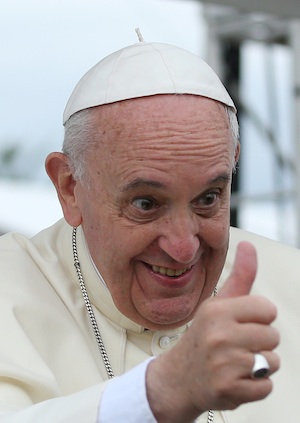
Religious News Service reports on comments Pope Francis made in unveiling a new bust of his predecessor:
The pope was addressing the plenary assembly of the Pontifical Academy of Sciences, which gathered at the Vatican to discuss “Evolving Concepts of Nature.”
“When we read about Creation in Genesis, we run the risk of imagining God was a magician, with a magic wand able to do everything. But that is not so,” Francis said.
“He created human beings and let them develop according to the internal laws that he gave to each one so they would reach their fulfillment.”
Francis said the beginning of the world was not “a work of chaos” but created from a principle of love. He said sometimes competing beliefs in creation and evolution could co-exist.
“God is not a [demiurge] or a magician, but the Creator who brought everything to life,” the pope said. “Evolution in nature is not inconsistent with the notion of creation, because evolution requires the creation of beings that evolve.”
This isn’t a terribly new sentiment, compared to official statements by Pope John Paul II, who commented in 1981:
Cosmogony and cosmology have always aroused great interest among peoples and religions. The Bible itself speaks to us of the origin of the universe and its make-up, not in order to provide us with a scientific treatise but in order to state the correct relationships of man with God and with the universe. Sacred Scripture wishes simply to declare that the world was created by God, and in order to teach this truth it expresses itself in the terms of the cosmology in use at the time of the writer. The Sacred Book likewise wishes to tell men that the world was not created as the seat of the gods, as was taught by other cosmogonies and cosmologies, but was rather created for the service of man and the glory of God. Any other teaching about the origin and make-up of the universe is alien to the intentions of the Bible, which does not wish to teach how heaven was made but how one goes to heaven.
And in 1996, he went further, telling the Pontifical Academy of Sciences:
evolution is more than a hypothesis. It is indeed remarkable that this theory has been progressively accepted by researchers, following a series of discoveries in various fields of knowledge. The convergence, neither sought nor fabricated, of the results of work that was conducted independently is in itself a significant argument in favour of this theory.
And even Pope Benedict XVI, who was widely seen as more friendly to creationism than his predecessor or successor (in part because of the appearance in 2005 in The New York Times of an “intelligent-design”-friendly op-ed by a close colleague) dismissed creationist attacks on evolution as “absurd,” telling clergy (in response to a fairly confusing question):
were God not to exist and were he not also the Creator of my life, life would actually be a mere cog in evolution, nothing more; it would have no meaning in itself. Instead, I must seek to give meaning to this component of being. Currently, I see in Germany, but also in the United States, a somewhat fierce debate raging between so-called “creationism” and evolutionism, presented as though they were mutually exclusive alternatives: those who believe in the Creator would not be able to conceive of evolution, and those who instead support evolution would have to exclude God. This antithesis is absurd because, on the one hand, there are so many scientific proofs in favour of evolution which appears to be a reality we can see and which enriches our knowledge of life and being as such. But on the other, the doctrine of evolution does not answer every query, especially the great philosophical question: where does everything come from? And how did everything start which ultimately led to man? I believe this is of the utmost importance.
Benedict’s statement, I should note, was not a prepared remark, so it's hard to judge relative to John Paul's and Francis’s carefully drafted and vetted comments. That may explain why Benedict’s comment is less philosophically sophisticated. John Paul’s 1996 statement goes on to describe theories as “metascientific” and to make fairly nuanced distinctions between what the Church elects (or is entitled) to proclaim regarding the creation of human souls and what science is entitled to say about the origins of the physical form of humanity, including the brain and psychology.
Pope Francis’s comments are being widely portrayed as a dig at his predecessor (e.g., The Independent, NPR, MSNBC, and the RNS article linked above). But as far as doctrine, this isn’t really new ground.
What’s remarkable is not the acknowledgement that evolution is good science and creationism isn’t, but the notably blunt language: I and other critics of creationism often dismiss the creationist proposals as arguing for “poof” (and ID creationist Michael Behe once referred to his creation model as consisting of “a puff of smoke”) but Pope Francis’s dismissing the idea of creationism as “a magician with a magic wand” puts that language on a whole new stage. Francis is not merely dismissing the creation/evolution battle as “absurd,” as did Benedict, but specifically calling out the absurdity of the creationist side. And that can only be for the good.

